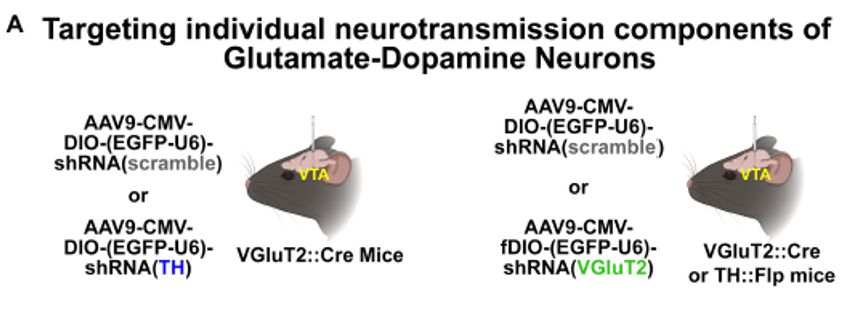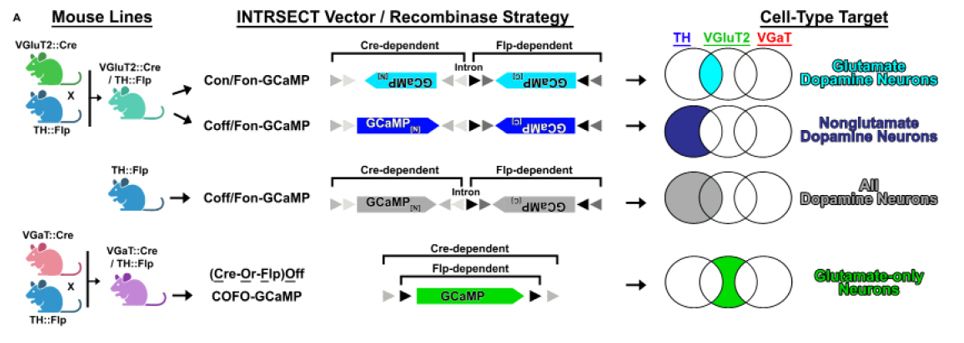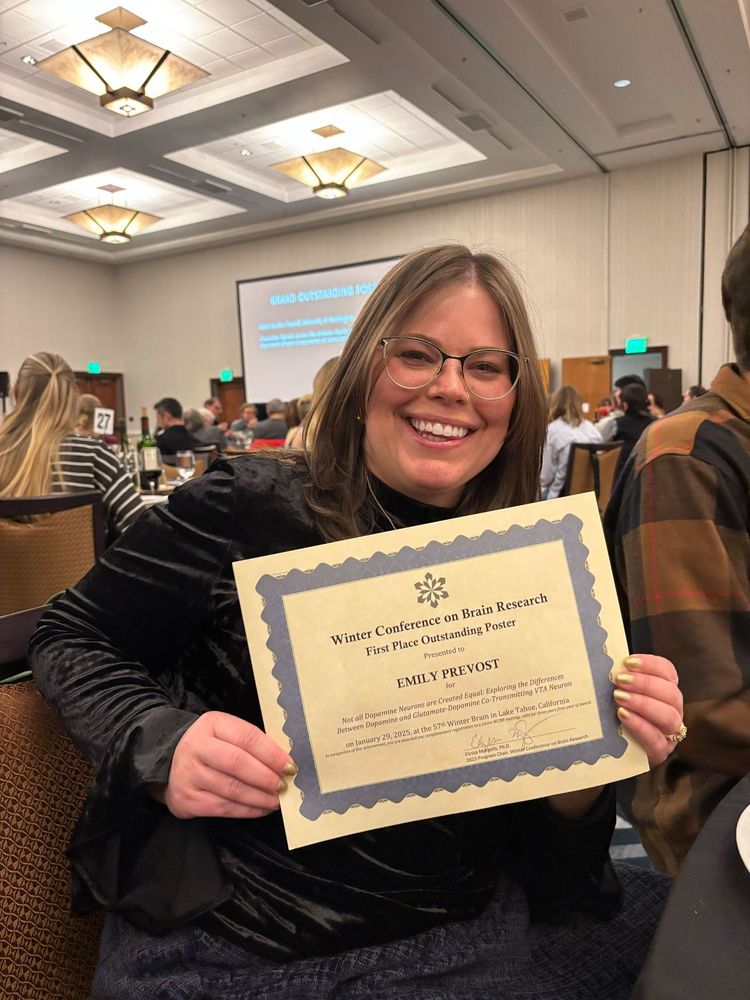Anyone else attending the Catecholamines GRS/GRC in August? Can't wait to share some new data!
03.05.2025 00:54 — 👍 2 🔁 0 💬 1 📌 0
Want to thank all who helped bring this project to light! @anniely.bsky.social , @ampolter.bsky.social , @neuronroot.bsky.social and all those who aren't on Bluesky
27.02.2025 19:25 — 👍 5 🔁 0 💬 0 📌 0
Altogether, we conclude that the signaling patterns and behavioral functions of VTA dopamine neurons depend on whether they co-transmit glutamate or release dopamine alone. Distinct glu and DA subpops—and individual NTs in co-transmitting neurons—contribute differentially to motivated behaviors 21/n
27.02.2025 19:25 — 👍 2 🔁 0 💬 1 📌 0

Finally, Zachary Kilpatrick expanded a classic neural circuit model of temporal-difference learning to account for glu-DA neurons, as well as the individual contributions of glutamate and dopamine from glu-DA and DA-only neurons. The model recapitulated some of our key behavioral results. 20/n
27.02.2025 19:25 — 👍 1 🔁 0 💬 1 📌 0

…But blocking glutamate release did not cause gross motor deficits which might explain the differences, nor impair escape responses to a simulated predator. We concluded that blocking glutamate release impairs reward- and exploration-related vigor without affecting aversion-related vigor. 19/n
27.02.2025 19:25 — 👍 2 🔁 0 💬 1 📌 0

Blocking glutamate release did not impact the acquisition of reward learning or fear learning/extinction. But it slowed reward retrieval latency and enhanced reward extinction, and suppressed exploratory behavior in an open field… 18/n
27.02.2025 19:25 — 👍 2 🔁 0 💬 1 📌 0

Knocking down TH (to block DA synthesis) didn’t impact acquisition of reward learning. But mice had deficits when learning about less-rewarding (reward CS-, reward extinction) or aversive (shock CS+) associations. 17/n
27.02.2025 19:25 — 👍 2 🔁 0 💬 1 📌 0

We zoomed in on glu-DA co-transmitting neurons and identified distinct functional roles for glu release and DA release in motivated behaviors. Using recombinase-dependent shRNA vectors, we blocked molecules necessary for DA synthesis (in glu neurons) or vesicular glu release (in DA neurons) 16/n
27.02.2025 19:25 — 👍 2 🔁 0 💬 1 📌 0

Anatomically, we also observed (as others have before) that glu-DA neurons heavily innervate NAcc medial shell, with some innervation in medial core. DA-only neurons heavily innervate NAcc core with some innervation in ventral and lateral shell. 15/n
27.02.2025 19:25 — 👍 2 🔁 0 💬 1 📌 0

We used ChRmine & GRABDA to measure opto-elicited NAcc DA release from VTA glu-DA or DA-only terminals. Axonal stim in both subpops increased DA release. Glu-DA axons were more sensitive to longer pulse trains in phasic magnitude. DA-only were more sensitive to longer trains in tonic duration 14/n
27.02.2025 19:25 — 👍 3 🔁 0 💬 1 📌 0
In sum, glu-DA neurons were activated in both rewarding and aversive contexts, but DA-only neurons had bidirectional activity in reward vs aversion. Examining all DA neurons together obscures the dissociable activity of subpops. Glu-only neurons are distinct from previously studied VTA subpops. 13/n
27.02.2025 19:25 — 👍 3 🔁 0 💬 1 📌 0
Importantly, in the nonselective population of all dopamine neurons together, we saw intermediate results between glu-DA and DA-only subpops. This is best exemplified in RPE signaling as well as shock and shock-predictive cue signaling (see previous posts). 12/n
27.02.2025 19:25 — 👍 2 🔁 0 💬 1 📌 0

Differences in signaling dynamics were starker in an aversive context. Glu-DA and glu-only neurons were activated to shock and the shock-predictive cue—glu-DA neurons strongly so. When measuring the minimum GCaMP value, we saw that DA-only neurons were suppressed at shock and cue. 11/n
27.02.2025 19:25 — 👍 2 🔁 0 💬 1 📌 0
Considering both RPE signaling and behavior-dependent signaling during the non-predictive cue, it appears that DA-only neurons suppress their activity when the animal recognizes that reward is not forthcoming. This was not observed in glu-DA or glu-only neurons. 10/n
27.02.2025 19:25 — 👍 2 🔁 0 💬 1 📌 0

Interestingly, DA-only neurons responded to the neutral cue (CS-) depending on the mouse’s behavior. When the mouse correctly avoided the port, activity decreased at the cue. But when the mouse incorrectly entered the port, activity decreased at the time reward “would” have come on a CS+ trial. 9/n
27.02.2025 19:25 — 👍 2 🔁 0 💬 1 📌 0

When an expected reward was omitted (reward prediction error), sustained activity of glu-DA neurons prevented a suppression below baseline, while transient activity of DA-only and glu-only allowed RPE signaling. This is the first RPE signaling identified in a VTA glutamate subpopulation. 8/n
27.02.2025 19:25 — 👍 4 🔁 0 💬 1 📌 0

In Pavlovian reward, all subpops were activated at reward and reward-predictive cue. But glu-DA neurons exhibited sustained activation between cue and reward peaks, while DA-only and glu-only exhibited transient activation in which activity dropped toward baseline between cue and reward peaks. 7/n
27.02.2025 19:25 — 👍 4 🔁 0 💬 1 📌 0
In vivo, we found that these subpops are dissociable in GCaMP signaling dynamics related to rewarding and aversive cues and outcomes: 6/n
27.02.2025 19:25 — 👍 2 🔁 0 💬 1 📌 0

The incredible @ampolter.bsky.social and Kailyn Price demonstrated that these subpops are electrophysiologically distinct. Some highlights: a subset of glutamate-only neurons exhibited Ih and D2 sensitivity; glutamate-dopamine neurons largely lacked Ih. 5/n
27.02.2025 19:25 — 👍 3 🔁 2 💬 1 📌 0

Additionally, we used a subtractive genetic strategy to target (for the first time) neurons that do not release dopamine and do not release GABA, which in the VTA selects for neurons that release glutamate alone. Our cellular targeting strategy is summarized here. 4/n
27.02.2025 19:25 — 👍 3 🔁 0 💬 1 📌 0
Using INTRSECTional genetics, we isolated VTA populations that co-transmit dopamine and glutamate or release dopamine alone (without glutamate). We compared this to current standard, which is to examine all dopamine neurons together regardless of co-transmission. See next for a visual summary. 3/n
27.02.2025 19:25 — 👍 1 🔁 0 💬 1 📌 0
Despite well-known molecular heterogeneity in VTA dopamine neurons (esp. glutamate co-transmission), hypotheses of VTA dopamine function presume a homogenous influence on behavior. We examined the functional consequences of heterogeneity in VTA dopamine and glutamate subpopulations 2/n
27.02.2025 19:25 — 👍 1 🔁 0 💬 1 📌 0
Must watch speech by neuroscientist Kailyn Price at a HHS rally protesting funding cuts to science.
"Cutting indirect costs is like telling a football team to work with only the players.
No lights for the field, no physical therapists for the players, no water for the showers."
19.02.2025 18:45 — 👍 1161 🔁 286 💬 10 📌 15

Honored to receive first place poster award at #wcbr2025! Thanks to all who stopped by. The poster (and my panel) explored divergent signaling dynamics in VTA dopamine subpopulations, as well as functional roles for glutamate and dopamine in co-transmitting VTA neurons. Stay tuned for more!
07.02.2025 23:45 — 👍 13 🔁 3 💬 2 📌 0
Professor at UC Irvine
Studying neural circuits controlling adaptive and dysregulated motivated behavior
Associate Professor, Anesthesiology, Washington University in St. Louis. Half of a two-body solution with four kids and a dog.
Neuroscience postdoc at NYU and former Simons Society Junior Fellow. Studying how estrogen modulates dopamine and learning in rats in the Constantinople lab. She/her.
Postdoc in the Calipari lab | Social Media for Stories of WiN | Topo Chico Fanatic | she/her
Imaging scientist at MPFI | Neuroscience, testing new tools to detect: dopamine, glutamate, serotonin, neuropeptide…
Dopamine Society brings together international scientists studying dopamine in the healthy and diseased brain.
SAVE THE DATE: 🧠📍May 17-21, 2026 Sevilla, Spain!
🚨Registration & abstract submissions: https://dopaminesociety.org/
Associate Prof of Psychology. I study how you remember (episodic memory), but am also interested in other areas of science (astronomy, geology, astrophysics, paleobiology, ecology, meteorology, etc) and other things too (architecture, birds, transit, etc).
interested in how we learn and later use knowledge in decisions, and how those processes can go awry in psychiatric disorders. LMDlab @UCL, MRC fellow.
themoorelab.org
Brown University
The Carney Institute for Brain Research
Neurobiologist @harvard | Dymecki Lab | interested in 5-HT, running and electronic music, sometimes simultaneously |
@Unipisa and @UninaIT alumnus
🧠 ucsf neuroscience postdoc
🍄 psychedelic researcher
🎨 www.twophotonart.com
🪡 weekend tattoo artist
neuroscience PhD candidate at Pitt interested in the development of cognitive and affective control, typically + transdiagnostically
Professor of Psychiatry & Psychology, University of Pittsburgh. Child Psychologist. Director, Cognitive-Affective Neuroscience & Development Lab. Mom of 4
Neuroscientist 🧠👩🏼🔬, UCLA, studying the brain circuits of learning, decision making, and habits.
Professor, Neuroscientist, Journal Editor (x4), fan of the dopamine, people, Marvel/Star Wars/Trek, and having a good time. @ubcpsych.bsky.social
Postdoc in Kate Wassum’s Lab (UCLA);
Dopamine Signaling in Decision Making.
Photography Enthusiast 📸 🌿
Postdoc in Ilana Witten's lab. Former PhD student in Kenneth Harris and Matteo Carandini's lab. Follow for updates on bombcell and other Neuropixels software.
https://github.com/Julie-Fabre
postdoc • neuroscience, psychedelics, RL & decision-making, ML @ McGill University / MILA Quebec AI Institute
•past Google DeepMind London / Montreal
https://veronicachelu.github.io
__
•meditation enthusiast
•yogi/200h RYT
•handbalancer/contortionist















